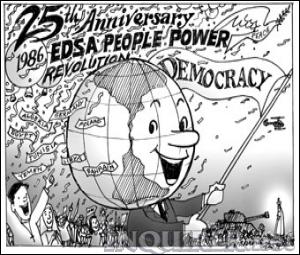Unfading glory
 We remember the sights: the press conference held by the leaders of the military breakaway group, a calm FidelRamos beside a visibly tense Juan PonceEnrile, with a statue of the Blessed Virgin Mary behind them; the first trickle of civilians pouring into Camp Aguinaldo on Saturday night to offer their support and protection; the confrontation on Sunday with the tanks at the corner of Epifanio de los Santos and Ortigas Avenues, with the nuns at the front, thousands of unarmed civilians beside and behind them; the sudden appearance of opposition personalities on government TV, after the studio had been liberated by reformist forces. Above all, we remember the heaving, yellow sea: the stirring sight of millions of people filling EDSA between Ortigas and P. Tuazon Street in Cubao, from Sunday afternoon to Tuesday night.
We remember the sights: the press conference held by the leaders of the military breakaway group, a calm FidelRamos beside a visibly tense Juan PonceEnrile, with a statue of the Blessed Virgin Mary behind them; the first trickle of civilians pouring into Camp Aguinaldo on Saturday night to offer their support and protection; the confrontation on Sunday with the tanks at the corner of Epifanio de los Santos and Ortigas Avenues, with the nuns at the front, thousands of unarmed civilians beside and behind them; the sudden appearance of opposition personalities on government TV, after the studio had been liberated by reformist forces. Above all, we remember the heaving, yellow sea: the stirring sight of millions of people filling EDSA between Ortigas and P. Tuazon Street in Cubao, from Sunday afternoon to Tuesday night.
We remember the sounds: the rumors that swirled through the country’s urban centers that fateful weekend; the first appeals aired on Radio Veritas, first by Butz Aquino, then by Jaime Cardinal Sin, for people to assemble outside Camp Aguinaldo; the uplifting strains of the 1950s campaign jingle “Mambo Magsaysay,” offering both instant nostalgia and cheerful resolve; the lilting voice of June Keithley, who would later be recognized as the “field marshal of the revolution,” streaming through Radio Veritas and then Radyo Bandido; the impromptu concerts staged outside the military camps by the Apo Hiking Society and their friends; the constant whup-whup-whupping of helicopter blades, as helicopter gunships patrolled the skies before Col. Antonio Sotelo’s air wing changed sides. Above all, we remember the unceasing murmur of rosaries being prayed, the passionate wailing of the opposition anthem “Bayan Ko” being sung.
We remember the feel: the cool days, the chilly nights. (Even the weather cooperated with the EDSA Revolution. After years of the Marcos personality cult, which extended to so-called Marcos weather—it is rather hard to believe, but there was a time when even mother nature was supposed to have done the bidding of the dictator Ferdinand Marcos, and guaranteed him sunny skies on his public appearances—it was liberating to say that the weather was now “on our side.”) We remember the emotions: a consciousness that Marcos’ troops could still attack and that therefore danger was real; an awareness that history was being made, and we were all involved in its making; not least, a sense that, on EDSA, everyone was, genuinely, even if only temporarily, equal.
Article continues after this advertisementThe four days of EDSA—from Saturday, Feb. 22 to Tuesday, Feb. 25—were truly glorious, a shining moment in our history. The happy revolution succeeded; this was, this is, the bottom-line basis of EDSA’s glory. The dictator was ousted, an entirely new government took over, democracy was restored.
But the EDSA Revolution was also an authentically “happy” one: peaceful, orderly, prayerful, compassionate (we will never forget the sight of civilians offering food and flowers to weary, war-hardened Marines) and above all popular, participatory. This is EDSA’s longer-lasting claim to glory. We coined the phrase “people power” (as it happens, an Inquirer editorial first used it on Dec. 13, 1985, more than two months before the EDSA Revolution)—and then we showed the world what we meant by it.
Twenty-five years later, and thanks in large part to the successful 18-day revolution in Egypt which led to the ouster of another dictator, we remember EDSA 1986 with hearts bursting, again, with pride. Sometimes, the almost ritual self-flagellation we Filipinos like to inflict on ourselves prevents us from seeing the plain truth. But during at least two defining moments in our history, we outdid ourselves, and showed a path for the rest of the world.
Article continues after this advertisementIn 1898, we were the first in all of Asia to establish a republic. And in 1986 we were the first in modern history to stage a people power revolution. True, much unfinished business remains—but the reality is we have been given the gift of a great start. It is a wonderful legacy we can use to our advantage, if only we put our minds to it and our shoulders to history’s wheel.
We remember.
















